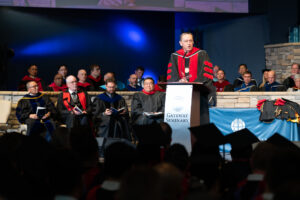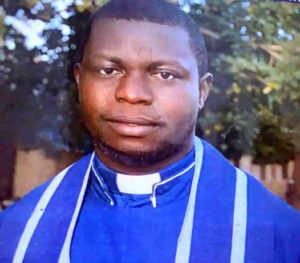
 Several years ago, I was blessed to observe inspirational generosity in action when I served as the development officer for the North American Mission Board.
Several years ago, I was blessed to observe inspirational generosity in action when I served as the development officer for the North American Mission Board.
One of our financial officers was visiting with Miss Katelyn in her home. As he was about to leave, she asked him to please wait while she went to visit her bank. Unsure of what to do, he awaited her return. When Miss Katelyn returned from the bank, she gave him her entire life savings to assist the people of Haiti. She instructed him to take all that she had for those who had nothing. She was not worried about the tax implications of her gift or about her needs for tomorrow. Her heart was filled with compassion for the greater needs of those in Haiti. Though Miss Katelyn had no regular source of income, she gave every dollar that she had diligently and meticulously saved over the years.
Miss Katelyn did not watch much television or have much interest in the Internet. She heard reports about the earthquake in Haiti on the radio, saw a few pictures of its devastation on TV, and heard her friends and family talk about the tragedy that was unfolding there. As she listened and watched, God placed on her heart a passion to help, and she was moved to respond with unbelievable generosity. Her discipline in personal spending had allowed her to accumulate her small fortune.
This experience helped me to understand more fully that personal stewardship is rooted in the scriptural principle of accountability to our Creator. In his letter to the Romans, Paul wrote, "So then, each of us will give an account of himself to God" (Romans 14:12). Just as we are responsible personally to God, we also are responsible for the proper stewardship of the resources which He has entrusted to each of us (Matthew 25:14-28).
The biblical principle of generosity is rooted not only in our accountability to God, but is also anchored in our understanding that God is the source of every good thing we receive (James 1:17). Once we understand this truth, as Miss Katelyn intuitively realized, our entire concept of stewardship will be transformed. We will not view our tithes and offerings as just another bill to be paid; we will understand them as a significant part of our worship, illustrating our purposeful and willful surrender to God.
One way to promote a proper attitude toward giving in our churches is to speak of "receiving" the offering rather than "taking" the offering. Over my four decades of involvement in church, I have often heard and even used the phrase, "We will now take up the offering." While seemingly innocuous, such wording may diminish the joy individuals experience through presenting their voluntary gifts to support missions and ministries designed to reach the world with the Gospel of Jesus Christ. How much better it is when churches "receive the offering" from joyous givers as a celebratory commitment of sacrifice and submission, rather than "taking" the offering with an implied sense of obligation. Giving should be viewed as an opportunity to worship our Lord, not merely an obligation to the church.
Miss Katelyn's willful and sacrificial generosity challenged and inspired me. Her family's story is also remarkable. Her decision to partner with NAMB and help the people of Haiti came as a result of her great grandparents' interaction with Southern Baptists. In the middle of the twentieth century, her great grandfather and his extended family evacuated the neighboring island of Cuba and escaped the communist revolution to find freedom in America. In Cuba, the family had been very affluent, but when they ran from their homeland in the middle of the night, they carried with them only the clothes on their backs. In America, they found Southern Baptists ready and willing to help them relocate and resettle, but more importantly, through the witness of Southern Baptists, they found the everlasting peace of our Lord and Savior, Jesus Christ. The generosity that their family received has been shared with each successive generation. And Miss Katelyn found a significant way to pass on the blessing that was extended to her family.
You might be surprised to learn that at the time of her gift, Miss Katelyn was a healthy, vibrant, inquisitive, and discerning five-year-old girl. Her gift was thoughtfully withdrawn from her piggy bank, and her entire life savings of six dollars was placed into the protective hands of her grandfather, Carlos Ferrer, NAMB's chief financial officer.
Many years have passed since her "Papi" Carlos fled the shores of Cuba with his family to find refuge in America. Today his legacy to Katelyn is one of generosity and selflessness. Instead of buying candy or doll clothes, her gift purchased twenty-five pounds of rice, enough to stave off starvation for a Haitian family of four for six days.
Unfortunately, many individuals and families who yearn to be generous like young Miss Katelyn, have placed themselves in financial bondage by spending more than they earn. They struggle to pay for basic needs of their families. You may think your financial situation is far different than Katelyn's, but her simple faith and obedience are exactly what Jesus referenced in the Gospel of Luke (Luke 18:17). As the free gift of God's salvation must be received with childlike faith, so our tithes and offerings to the Lord should be given with the same simplicity and cheerfulness. How much better would it be if followers of Christ did not "give reluctantly or out of necessity," but were able truly to experience cheerful giving because they live their lives in a responsible manner (2 Corinthians 9:7).














